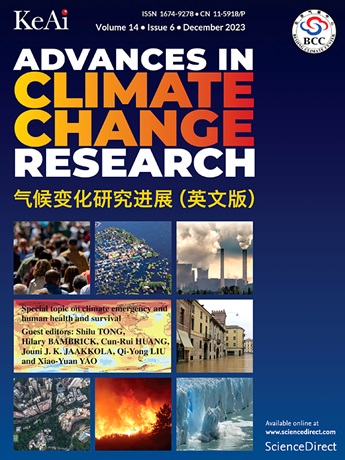气候变化将在很大程度上抵消中国二孩政策带来的劳动力增量
IF 5.2
1区 地球科学
Q1 ENVIRONMENTAL SCIENCES
引用次数: 0
摘要
中国实施的二孩政策(TCP)旨在应对人口老龄化带来的经济挑战。然而,气候变化对这一政策目标的影响仍然不确定。本研究考察了气候变化引起的热应激如何影响工作年龄人口的生产力,以TCP的总工作时间来衡量。与之前的计划生育政策相比,在2071-2100年期间,TCP预计将在三种情况下使中国的总工作时间增加12%-19%。由于气候变暖造成的热应激导致劳动能力下降,总工作时间减少了19%-29%,这完全抵消了这一增长。具体而言,与2071-2100年的独生子女政策(OCP)相比,TCP对总工作时间的贡献最大,增加了19%,但如果在SSP370情景下考虑气候变化,总工作时间将减少9%。同样,在SSP126和SSP585情景下,TCP的收益可以被气候变化完全抵消,最终导致OCP分别减少6%和11%。在经济最发达的中国东部和南部地区,气候变化的不利影响尤为明显(SSP370下总工作时间减少30%或更多)。鉴于中国的劳动密集型经济模式,这项研究强调了采取紧急缓解战略以保障国家未来经济福祉的必要性。本文章由计算机程序翻译,如有差异,请以英文原文为准。
Climate change would largely offset labor capacity increment fueled by China’s two-child policy
China’s implemented two-child policy (TCP) was aimed at countering the economic challenges posed by an aging population. However, the impact of climate change on the goal of this policy remains uncertain. This study examines how climate change induced heat stress may impact the productivity of the working-age population, measured as total working hours as a result of the TCP. The TCP is projected to increase total working hours of China by 12%–19% under three scenarios compared to the previous one-child policy during 2071–2100. This increase is completely negated by a 19%–29% decrease in the total working hours induced by reduction in labor capacity from heat stress under climate warming. Specifically, compared to the one-child policy (OCP) in the 2071–2100, the total working hours shows the largest increase of 19% contributed by TCP but it can decrease by 9% if climate change is considered under the SSP370 scenario. Likewise, the TCP benefits can be totally offset by climate change which finally leads to 6% and 11% less than OCP under the SSP126 and SSP585 scenarios, respectively. Climate change’s adverse effects are particularly pronounced (30% or larger decrease in the total working hours under SSP370) in eastern and southern China, which has the most developed economy. Given China’s labor-intensive economic model, this study underscores the need for urgent mitigation strategies to safeguard the nation’s future economic well-being.
求助全文
通过发布文献求助,成功后即可免费获取论文全文。
去求助
来源期刊

Advances in Climate Change Research
Earth and Planetary Sciences-Atmospheric Science
CiteScore
9.80
自引率
4.10%
发文量
424
审稿时长
107 days
期刊介绍:
Advances in Climate Change Research publishes scientific research and analyses on climate change and the interactions of climate change with society. This journal encompasses basic science and economic, social, and policy research, including studies on mitigation and adaptation to climate change.
Advances in Climate Change Research attempts to promote research in climate change and provide an impetus for the application of research achievements in numerous aspects, such as socioeconomic sustainable development, responses to the adaptation and mitigation of climate change, diplomatic negotiations of climate and environment policies, and the protection and exploitation of natural resources.
 求助内容:
求助内容: 应助结果提醒方式:
应助结果提醒方式:


